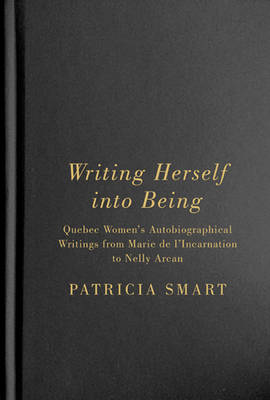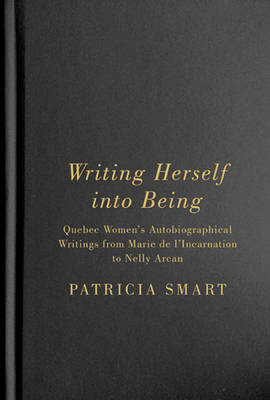
- Afhalen na 1 uur in een winkel met voorraad
- Gratis thuislevering in België vanaf € 30
- Ruim aanbod met 7 miljoen producten
- Afhalen na 1 uur in een winkel met voorraad
- Gratis thuislevering in België vanaf € 30
- Ruim aanbod met 7 miljoen producten
Zoeken
Writing Herself Into Being
Quebec Women's Autobiographical Writings from Marie de l'Incarnation to Nelly Arcan
Patricia Smart
Hardcover | Engels
€ 177,45
+ 354 punten
Uitvoering
Omschrijving
WINNER - Prix du livre d'Ottawa 2016 WINNER - Prix Jean-Éthier-Blais 2015 WINNER - Prix Gabrielle-Roy 2014 FINALIST - Prix littéraire Trillium 2015 From the founding of New France to the present day, Quebec women have had to negotiate societal expectations placed on their gender. Tracing the evolution of life writing by Quebec women, Patricia Smart presents a feminist analysis of women's struggles for autonomy and agency in a society that has continually emphasized the traditional roles of wife and mother. Writing Herself into Being examines published autobiographies and autobiographical fiction, as well as the annals of religious communities, letters, and a number of published and unpublished diaries by girls and women, to reveal a greater range of women's experiences than proscribed, generalized roles. Through close readings of these texts Smart uncovers the authors' perspectives on events such as the 1837 Rebellion, the Montreal cholera epidemic of 1848, convent school education, the struggle for women's rights in the early twentieth century, and the Quiet Revolution. Drawing attention to the individuality of each writer while situating her within the social and ideological context of her era, this book further explores the ways women and girls reacted to, and often rebelled against, the constraints imposed on them by both Church and state. Written in a clear and compelling narrative style that brings women's voices to life, Writing Herself into Being - the author's own translation of her award-winning French-language book De Marie de l'Incarnation à Nelly Arcan: Se dire, se faire par l'écriture intime (Boréal, 2014) - offers a new and gendered view of various periods in Quebec history.
Specificaties
Betrokkenen
- Auteur(s):
- Uitgeverij:
Inhoud
- Aantal bladzijden:
- 336
- Taal:
- Engels
Eigenschappen
- Productcode (EAN):
- 9780773551183
- Verschijningsdatum:
- 10/11/2017
- Uitvoering:
- Hardcover
- Formaat:
- Genaaid
- Afmetingen:
- 577 mm x 231 mm
- Gewicht:
- 616 g

Alleen bij Standaard Boekhandel
+ 354 punten op je klantenkaart van Standaard Boekhandel
Beoordelingen
We publiceren alleen reviews die voldoen aan de voorwaarden voor reviews. Bekijk onze voorwaarden voor reviews.








